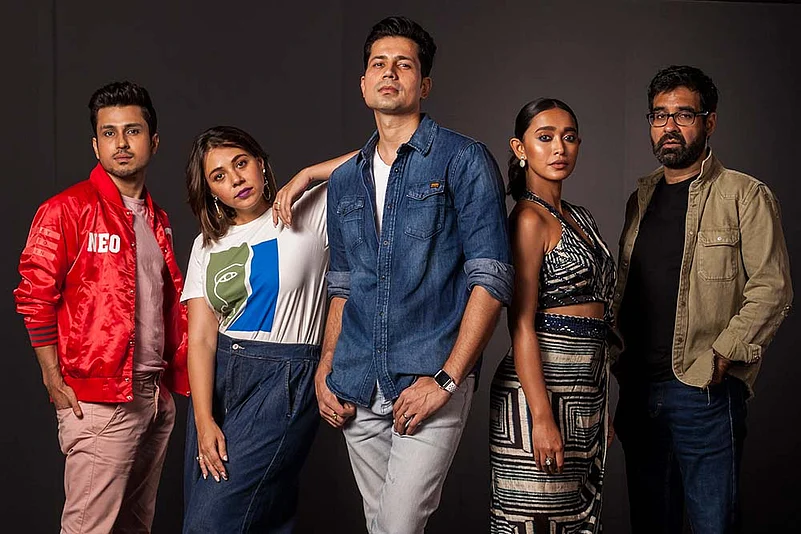The expletives are not muted, the sex scenes unrestrained with moaning, groaning, the work...and the violence is gory—brains blown off by a shotgun, blood squirting out of a neck slashed with a razor. And lording over all these is the devious and ruthless Akhandanand ‘Kaleen Bhaiya’ Tripathi, played by national award winning actor Pankaj Tripathi in Amazon Prime’s Mirzapur, a gangster web series set in the badlands of Uttar Pradesh. Mirzapur is a gripping tale despite the excessive violence and is all set for the second season, just like Sacred Games, the first hugely popular fare from the growing over-the-top (OTT) platform in India.
But the story of the growing popularity of web series in India also has a sub-plot concerning the Indian entertainment industry—it is now the launch pad for newcomers trying to find a foothold in tinsel town. Web series are what television serials were not so long ago—remember the TV series Circus that turned a certain Shah Rukh Khan to King Khan of Bollywood? The OTT platform is also the new playground for accomplished actors looking to break grounds with more challenging roles outside the two-hour-odd cinematic timeframe. These are “exciting times” for upcoming actors, as Shweta Tripathi, who plays the role of Gajagamini ‘Golu’ Gupta in Mirzapur, puts it.

Kubbra Sait plays a transgender bar dancer in Sacred Games.
For actors who love to get under the skin of characters, the longer format is the perfect medium to showcase their skills. And the growing A-list of actors— from Nawazuddin Siddique and Manoj Bajpayee, to Adil Hussain and Saif Ali Khan—dallying in web series suggests the OTT platform is set to grow bigger. The main reason for viewers shifting to web series is the phenomenal rise in mobile video streaming in India—nearly 200 per cent over the past two years, the highest in 10 countries tracked in a report by App Annie. The relatively low subscription rates have also helped the OTT platforms penetrate deep into semi-urban and rural India. While Netflix charges Rs 599 a month, Hotstar comes for a monthly rate of Rs 299. Ektaa Kapoor’s AltBalaji, known mainly for its adult series, charges as low as Rs 100 for three months. People with smartphones/tabs and mobile data can now watch whatever, wherever, whenever they want to. “It’s no longer about one TV screen in a house where everyone is forced to watch whatever the general consensus is,” says Tisca Chopra, who played the lead role of Dr Meera Anand in the Hotstar web series Hostages. “Kids are watching their stuff on their phones or tablets while parents hog the TV screen or vice versa. This is making stars out of actors who earlier had smaller roles in big films. It’s truly the age of the actor.” In the 10-episode series, Tisca plays a doctor who has to decide whether to save her family by obeying those holding them hostage and asking her to kill a man.
“Actors can really explore a character on the digital platform...a series is almost like doing four to five films at one go,” adds the actor, who had mostly played smaller roles in Bollywood movies. Pankaj Tripathi too feels that web series, unlike cinema, “give us opportunities to go into the detailing and explore our characters in depth”.

Amol Parashar of TVF’s Tripling fame (this photo as well as the cover picture were taken at PLAY-The Lounge, Mumbai).
Content Is King
The rise of OTT platform also coincides with Indian television incessantly churning out predictably crass saas-bahu soaps from its assembly line, which made no sense to the large population of the young and upwardly mobile growing up with more relatable western TV and web series. They were looking for better “content”. And then came Permanent Roommates. The first web series made in India, it was streamed on YouTube in 2014. “We shot the third episode from 12 am to 6 am,” says Sumeet Vyas, who plays the role of Mikesh in the series about modern-day relationships and became India’s first “web star” . “At that time, we had four lakh-odd hits on the YouTube channel…there were people waiting for the episode to be uploaded, waiting to watch it... Before this, not many people knew I existed...not a good sign for an actor. Now audiences know that I am an actor who does credible work. If your story is original, contemporary and relatable, then there is an audience.”
“Television needs a new energy and it is not easy as that takes years of conditioning. They need to understand how differently they can tell a story,” adds Sumeet, who also worked in Tripling, a quirky series about three siblings who go on a road trip.

Parashar with Sumeet Vyas and Maanvi Gagroo in a still from Tripling.
For the younger generation, taut storylines and well-defined characters are definite draws. As are the actors themselves—with not exactly Bollywood looks, they are more of girl-next-door or college-going neighbourhood youngsters. Or a brooding uncle in the family. Sayanii Gupta, who shot to prominence through Inside Edge and Four More Shots, gives the perfect example. “For instance, if you look at Pankaj Tripathi, you realise that he should have been on posters and hoardings long ago. It is only with web series that fantastic actors are getting due recognition,” she says. Now shooting for season two of Four More Shots, Sayanii feels web series have made it easier for actors of all age groups and given them a more supportive environment. “Men, women, boys and girls of different age groups, shapes, sizes, colour, facial features…everyone can be on the posters of web series and also get their due credit as actors.”
The vast canvas—gangster, romcom, spy thriller, horror, adult shows—has opened up a whole new world not just for actors, but also for the Indian audience. With web series being made in regional languages and in different genres, actors are spoilt for choice, as are viewers.

Bani J, Maanvi Gagroo, Sayanii Gupta and Kirti Kulhari in Four More Shots.
A Star Is Born
Maanvi Gagroo is one of those who have found their place in the sun, er…the spotlight on the OTT platform. After small roles in a few films like PK and No One Killed Jessica, she found her calling in web series Pitchers and Tripling, which put her on the way to stardom. Now she is all set for the big screen opposite Ayushman Khurrana in Shubh Mangal Zyada Saavdhan.
For Maanvi, web happened at a time when she wasn’t getting any exciting offers. “Roles coming my way were clichéd and not stimulating at all. So, when TVF’s Pitchers happened, which was my first web show, it almost gave me a new lease of life. I was recognised for my work and the work that came after that was also far more respectable,” she says. So what is the secret behind the success of web series? “The characters talk like us, dress like us and have the same issues like ours. Also, every content creator aims to stand out, so they experiment with the story, concept or format. That’s refreshing.”

Shefali Shah plays a police officer in Delhi Crime.
Kubra Sait admits “it was only through web series that people found out that I existed although I had done films before that”. Her role as Kukoo, a transgender bar dancer in Sacred Games, is acknowledged as one of the most “different” characters for Indian audiences in a long time. Kubra, who went on to appear in TVF web series like Tripling Season 2 and Zee5’s Rejectx, says freshness is what makes web series so exciting. “It has opened up space for first-time directors, script writers, actors and music composers. Since there are so many firsts, the taste of each web series is new.”
Maanvi says the concept of stardom has also changed in the age of social media—now it’s measured in terms of followers. Anyone who has engaging content, in whichever way, is likely to have a large following. It’s a way for fans to directly interact with stars they look up to. “I have had a fabulous time in the web space. So, I am extremely proud and possessive of this medium,” she adds. She does not add that new stars of web series are, perhaps, more grounded and are liked because they are without the trappings of Bollywood biggies living lives far removed from that of their fans.
“In the web space, appreciation from the audience is spontaneous. People follow the actor’s journey, and it is quite inspiring and humbling as an artiste to know that people are interested in your craft,” says Sumeet. Sayanii Gupta calls it “emotional investment” by the audience. “When you get messages from the audience, it is actually quite humbling and gives you a sense of responsibility because they are waiting for the next episode,” she says. “So, you have to give your best. People even walk up to us in malls, restaurants and theatres, and ask about the next web series.”
According to Mukul Chadda, who plays the role of Jagdeep Chaddha in the Indian adaptation of the popular US show The Office, what attracts actors to OTT is the fact that “web series have allowed more actors to be seen and get recognised for their talent.”

Sumeet Vyas and Nidhi Singh in Permanent Roommates.
With big players pumping money into web series, it is also bringing much financial security to actors. Netflix’s Bard of Blood, co-produced by SRK’s Red Chillies Entertainment, has been made with a budget of Rs 50 crore, a huge sum in the nascent Indian market. “The budgets and scales have definitely increased manifold, which is an added advantage,” says Amol Parashar of TVF’s Tripling fame. “It means we now have the security to choose only the work we want to do and put our hearts in it.” Sumeet agrees, “The most lucrative part about web series is the financial aspect and that producers are willing to pay you for your craft…. The price I quote these days is much higher than what I could five or six years back, and I hope it grows with time not only for me, but for everyone who is talented and serious about his or her craft.”
The Future Is Here?
But is web series the future of entertainment in India? The projected numbers definitely point in that direction. India is set to be among the world’s top 10 OTT video markets by 2020 with revenue of around Rs 5,595 crore. And there are big names such as America’s Netflix and Amazon Prime Video, production houses like Balaji Telefilms’s ALTBalaji and Eros Now, along with broadcast networks like Star India’s Hotstar and Sony Entertainment Television’s SonyLIV.
In 2017, Erricson Consumer Lab predicted that by 2020, about 50 per cent of all TV and video viewing would take place on a mobile screen—tablets, smart phones, laptops—an increase of 85 per cent since 2010. Additionally, virtual reality would also become mainstream with one in three consumers becoming a VR user by 2020. Driving this boom will be the young Indian.
Ali Hussein, COO of Eros Now, says the demographic profile of OTT viewership ranges from 18 to 35 years, and that band comprises two segments: 18 to 24 years and 24 to 35 years. “Television and OTT target two different demographic audiences,” he says. “The older population will start reducing over time, and video viewing is going to go up drastically through mobile distribution and cheaper data.”
Web series is meant to cater to a global audience, which is why there is so much quality control, as Shefali Shah puts it. “As they aren’t stretched for 100-plus episodes, the story and the characters stay true to what they were intended to be,” says the actor, who was recently seen in Delhi Crime. “The focus is not on quantity, but on quality. They’re more like eight or 12 hours of film.”

Tisca Chopra plays a doctor in crime thriller Hostages.
This is precisely why OTT platforms are resisting the government’s proposal to bring a censorship mechanism for regulating the content of web series—mainly adult themes and strong language. Web series makers feel the medium is thriving because it is not bound by such shackles. Viewers definitely feel so. “Censoring web series will kill its novelty. It is so gripping because it’s so earthy,” says Sanjay Kakkar, a Delhi-based textile merchant who admits to be being a binge-watcher.
Which other medium would ever show an aged and wheelchair-bound patriarch of a mafiosi family blackmailing his daughter-in-law to have sex with him and then cutting off the manhood of the servant with whom she had an affair? It’s heady stuff out there, even to the point of being forbidden. But then, isn’t the forbidden fruit the most seductive?


























